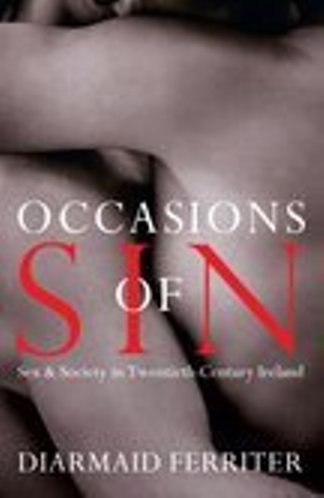 Irish Eyes
Irish Eyes
By
Mattie Lennon
We Didn’t Know The Half Of It
A high-profile T.D. blamed television for it. It was a
thriving industry which contributed nothing to the exchequer in
taxes. My nose has a Grecian bend because a concerned citizen, who
disapproved of my telling jokes about it, head-butted me in
Blessington in 1963. I’m referring to sex in 20th century Ireland
when everything from masturbation to gazing at female dummies in
drapers’ windows merited Eternal damnation.
All pelvic activity was spoken of in metaphor and euphemism
on a nudge-nudge, wink-wink basis. Abuse, frustration, erectile
dysfunction, VD, rape, homosexuality, infanticide, bestiality and
incest were subjects to be avoided in serious conversation and
media coverage. As the late John B. Keane put it at the time,
“Writing about sex in Ireland is like writing about poitin in Iran.
The anti-sex mullahs will bid for your jugular.”
In the introduction to his latest book, Occasions of
Sin, Diarmaid Ferriter refers to Ireland in the twenty-
first century as, “a country long accustomed to a strict
policing of sexual morality . . .” and which has, “carnally
come of age”. When an author is doing research, on almost any
subject, he or she can, usually, rely on the newspapers from the
relevant period. Professor Ferriter did not have this luxury. There
is a dearth of information on sex crimes in the newspapers of the
day. The scant references to such crimes reflected a severe anti-
woman bias. The Cork Examiner, in 1936, reported a judge referring
to two teenage girls being used for sex in the back-streets of Cork
City. No male was criticised but the learned judge said the,
“two little girls . . . . were a positive danger to the people of
Cork.” It would appear that the Judiciary hadn’t broken free
of the mindset which prompted Elizabet Cady Stanton, in the
previous century to say, “ Woman’s degradation is in man’s idea
of his sexual rights.” But, as Professor Ferriter points out,
there was no shortage of transgressions, “ . . . which becomes
apparent when one begins to examine the extent of sexual crime and
abuse, as well as legal behaviour perceived as socially
transgressive, like unmarried motherhood.”
Occasions of Sin is a history of sex and
society in twentieth-century Ireland and is an eye-opener for
those who were born towards the end of it and contains some vivid
reminders and revelations for those who lived though it; we didn’t
know the half of it. The last century, in Ireland, was an age
when the word “shift” in a script caused riots, Alan Simpson was
brought to court over “The Rose Tattoo” and the mention of a
“nightie” on the Late Late Show caused uproar. I had to hide
“The Ginger Man” in the cow-house and shop assistants were
obliged to pull down the shutters when changing the clothes on
mannequins. Those were the things that we knew about. Professor
Ferriter points out that, “It was assumed that in terms of
sexual morality Ireland was different to other countries; there was
a delusion that there were certain sexual problems from which
Ireland had immunity; they were ‘ foreign vices’ usually associated
with England.” In more recent times Peter DeRosa wrote,
“Irish people are among the most intelligent in the world. Why did
they allow idiots to decide for them what was, or was not, art and
mortality?” Perhaps Diarmaid Ferriter has found a partial
answer to that question.
This book is, as the author tells us, “ . . . filled with
the voices of victims and perpetrators of sexual abuse, violence
and assault. The recounting of their experiences as revealed in the
depositions and witness statements prepared for court cases is
essential in order to get some sense of how these sexual crimes
impacted on individuals and communities, the language used to
express what was experienced, the vulnerability experienced and a
sense of what went on behind closed doors.”
Angela Audretsch of Profile Books told me, “We are
thrilled to be publishing Diarmaid’s new book – he is one of
Ireland’s most brilliant young historians tackling a critical topic
in Irish history which has often been neglected and
misunderstood.”
Click on author's byline for bio and list of
other works published by Pencil Stubs
Online.

|